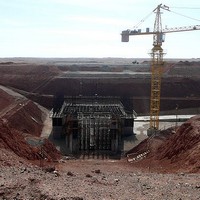China's restriction of global access to its deposits of rare earth elements starting in 2010 changed the status of these materials in the global economy, creating new diplomatic alliances across Asia and increasing the importance of mining in trade agreements. A series of trade agreements in Central and Southeast Asia, announced over the past month, reveal the ways manufacturers and mining conglomerates are coping with potential shortages two years after China's rare earth consolidation. Nevertheless, difficulties inherent to extraction and processing mean that delays will hamper access to new sources of rare earth supplies even when supported by strong investments.
Deng Xiaoping's observation that rare earths were to the Chinese economy what oil is to Saudi Arabia's has proved accurate. Like Saudi Arabia and its oil reserves, China has gradually retained more and more of its rare earth elements for domestic use over the past decade. Supplying roughly 95 percent of the world's rare earth consumption, China shocked markets with its sudden restrictions on exports in 2010 and 2011, cutting quantities sent to Japan and then the U.S. and other Western trading partners in the aftermath of a maritime incident off the disputed Senkaku Islands. Rare earths take longer to find and extract than oil, and many of the world's mines had closed over the years when China was becoming the world’s principal supplier. Shortfalls in global rare earth supplies now seem imminent, as electronics manufacturers continue to increase their demand. In response, mining corporations backed by national governments are scouring the developing world, especially Central Asia, for new sites.
The U.S. has yet to formulate a comprehensive plan for dealing with probable shortfalls in rare earth supplies and has not reacted as quickly as major Asian economies. Congress and the Defense Department first publicly discussed the issue last year, noting that rare earth elements are essential components of missile guidance systems and other military electronics. Ultimately, both the U.S. and the European Union responded to China's actions by calling for rare earth elements to be stockpiled for emergency shortages. British leaders also directed construction of a “strategic metals stockpile.” None of these plans is accompanied by clear indications of where the elements will be sourced, however, and there are no standout candidates among mining corporations in this regard.

